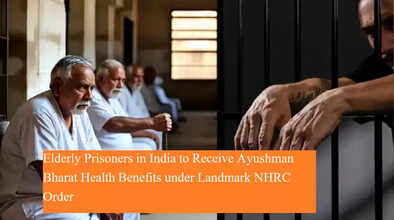Elderly Prisoners in India to Receive Ayushman Bharat Health Benefits under Landmark NHRC Order

In a groundbreaking move aimed at promoting human rights and inclusive welfare, the National Human Rights Commission (NHRC) has directed all states and union territories in India to extend the Ayushman Bharat health scheme benefits to elderly prisoners aged 70 and above. This decision ensures that even inmates serving time behind bars will not be excluded from essential government healthcare schemes.
This initiative marks a significant shift in how healthcare access is delivered in India’s correctional facilities, reaffirming that age and imprisonment should not become barriers to basic health rights.
NHRC's Major Decision: Inclusion of Elderly Inmates in Ayushman Scheme
As per the NHRC order, all jail superintendents and directors across the country have been instructed to register inmates aged 70 years and above under the Ayushman Bharat Pradhan Mantri Jan Arogya Yojana (PM-JAY). Specifically, they will be enrolled in the Ayushman Vay Vandana component, which offers health insurance coverage up to ₹5 lakh per year for secondary and tertiary care.
Elderly prisoners will also receive Ayushman Vay Vandana cards, ensuring that they can access treatment at empaneled hospitals nationwide, just like any other senior citizen eligible under the scheme.
Why This Matters: Health Rights for All
The NHRC’s decision came in response to a formal complaint urging the extension of healthcare benefits to elderly inmates. Recognizing the merit of the plea, the NHRC emphasized that the goal of government welfare programs is to benefit all eligible individuals — including those in custody.
Citing Article 21 of the Indian Constitution, which guarantees the right to life and personal liberty, the NHRC highlighted that access to adequate medical care is a fundamental right, even for those incarcerated.
The commission also referenced a Supreme Court ruling, affirming that prisoners remain under the state's custody and are entitled to quality healthcare, as they cannot seek medical services independently. Jail authorities are duty-bound to provide necessary treatment and uphold inmates’ right to health.
States Asked to Act Promptly: 4-Week Deadline for Implementation
The NHRC has mandated all prison authorities to submit a compliance report within four weeks. This report must include the number of eligible inmates enrolled under the scheme and the steps taken to ensure smooth registration and issuance of health cards.
The commission stressed that no one should be excluded from welfare due to incarceration, especially vulnerable elderly populations who are more prone to chronic illnesses and require regular medical attention.
Background: Aging Prison Population in India
Although there is no exact current data on the number of prisoners aged 70 and above, the NCRB (National Crime Records Bureau) 2022 report provides some perspective. It states that:
-
Over 27,000 convicted prisoners were aged 50 or above as of December 31, 2022.
-
Among undertrial inmates, over 44,900 were over 50 years of age.
These figures indicate a growing elderly demographic within the prison system, underlining the importance of prioritizing their health and well-being.
A Step Towards Inclusive Justice
This landmark decision by NHRC is not just a policy update but a testament to India’s evolving approach to inclusive justice and human rights. By acknowledging the medical needs of elderly inmates, the government takes a firm stand that human dignity remains intact regardless of imprisonment.
Health advocates and human rights experts have welcomed the move, saying it could set a precedent for other welfare schemes to be extended to prison populations in the future.
Conclusion: Health Care for the Forgotten
With the Ayushman Bharat scheme now reaching the cells of Indian prisons, thousands of elderly inmates will gain access to life-saving healthcare. It’s a timely reminder that the right to health doesn’t stop at the prison gate — and that every life, no matter the circumstance, deserves care, respect, and dignity.

